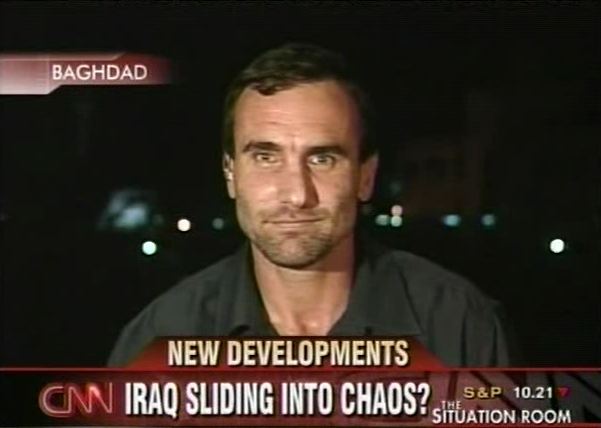TSR: "The most gripping emotion among ordinary people is fear."

Click photo to play
Length: 4:09
WOLF BLITZER: Today there are more examples of Iraq's chaos. Police found 35 bodies, some with gunshots to their head. And two sports figures, including the man who coached a disabled volleyball team, were kidnapped. All the violence is being closely and carefully watched.
And joining us now from Baghdad, our correspondent Michael Ware -- Michael, thanks very much.
"The New York Times" published a chart today it says it got from the U.S. military's Central Command, which oversees the entire region, including Iraq, and it's very ominous because it shows the current level of violence in Iraq right now getting ominously close to chaos as opposed to the other side, which is peace.
Does this square with what you're actually seeing on the ground?
MICHAEL WARE, CNN CORRESPONDENT: Well, Wolf, the short answer is absolutely. I mean, where this graph, you know, illuminates the situation -- as we see the pointer teetering further and further away from the green of peace and closer into the spectrum's end of red in chaos -- is arguably the most accurate reflection we've seen of the situation here on the ground to come out of either the U.S. military or the administration.
I mean, despite the tonnage of words that comes from politicians and generals and commanders trying to put things within a certain political reference, here it is. And you see it for yourself in this graph. Iraq is within a fraction of all-out chaos. I mean, the best that you could say right now, if such a term exists, is that it's contained chaos. All that it needs now is for it to break out and to be unleashed.
I mean, when you walk on an Iraqi street today, when you go down any avenue here in Baghdad, the most dominant feeling, the most gripping emotion among ordinary people is fear. And that fear is legitimate.
BLITZER: And this comes only six days before the US elections here, elections which are clearly being dominated by what's happening on the ground in Iraq.
You've been doing a lot of reporting on the rift, on the strain in the relationship between the prime minister of Iraq, Nuri al-Maliki, his government, and the Bush administration. And it's now surfacing to a certain degree in terms of the U.S. abandoning some checkpoints around Sadr City, where their suspicion is this American soldier could be held.
What's the latest on that front?
WARE: Well, what we saw yesterday is that following a demand by the rebel anti-American cleric and the leader of the Jaish al-Mahdi Militia, Muqtada al-Sadr, for a general strike, civil disobedience in Sadr City until the checkpoints and the lockdown was removed, is that, you know, by lunchtime, we had the Iraqi prime minister, in his words, according to his statement, ordering that these checkpoints be opened.
And within hours, the permanent checkpoints that existed before the lockdown and still exist now, which were closed, suddenly opened. Other temporary checkpoints in another part of the city, which were designed primarily to serve the hunt for the U.S. soldier, were completely removed.
Now, a senior U.S. diplomatic official conducted a teleconference with journalists last night to try and explain that this was not a sign of the rift and the Iraqi government was not countering the U.S. military.
But I have to say, Wolf, it was less than convincing.
BLITZER: Michael, thanks very much.
Michael Ware reporting for us from Baghdad.
WARE: Thank you, Wolf.
BLITZER: And he does a fabulous job for us -- Jack Cafferty, I think you will agree.
JACK CAFFERTY, CNN ANCHOR: He's a...
BLITZER: Michael Ware...
CAFFERTY: He's as good as it gets.
BLITZER: Yes.
CAFFERTY: He's terrific.
BLITZER: A brilliant, courageous reporter.
CAFFERTY: He could have your job.
BLITZER: You've said that before.
CAFFERTY: I'm just kidding.
Then we wouldn't have that great coverage coming out of Iraq.
I skated on that pretty good.
